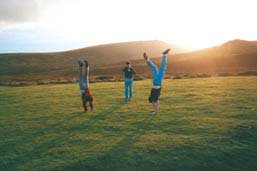![]()
ALUMNI MAGAZINE
AUGUST 1999
| CONTENTS AND FEATURES | ||
| LETTERS | ||
| AROUND TAPPAN SQUARE | ||
| A STUDENT PERSPECTIVE | ||
| HISTORIAN'S NOTEBOOK | ||
| ALUMNI NEWS | ||
| THE BEAR NECESSITIES | ||
| ONE MORE THING | ||
| STAFF BOX |
Story by Bethany Schneider '93
 |
It's a cold, clear November evening. Twenty-two mud-covered Oberlin students pour through the doors of a pub in the middle of Dartmoor, a 365-square-mile wilderness in southern England. A sign on the wall identifies this as the third-highest pub in the UK, and announces that the fire in the fireplace hasn't been extinguished in 80 years.The elevation is no surprise to these weary hikers, and while the fire is welcome, the non-vegetarians among us are more interested in the homemade venison pie. We agree that a pint of Tanglefoot, the local bitter, goes a long way towards mending muscles that have hiked all day across boggy moorland. English professor Scott McMillin and computer science professor Bob Geitz lean back and smile contentedly as the students fall into an argument: does science exist separately from nature? Did Geoff mean to allow Charlotte--the muddiest student of all--to fall backwards into a freezing cold stream?
Mid-debate, Scott holds a bite of venison aloft on his fork. "This is what the London program is all about," he says. It's unclear whether he means good food or good conversation, but after all, isn't appetite at the center of an engaged and balanced education? The Danenberg Oberlin-in-London program, of which these students are a part, is about satisfying a hunger for learning, extending the classroom to the social, physical, and even the gastronomic.
The interdepartmental program was founded in 1983, its primary aim to provide students with an intensive interdisciplinary learning experience that engages them with the subjects they study and the environment in which they live. Two professors from different departments lead the group each semester and teach a joint class.
Sometimes the collaboration involves disciplines more traditionally linked than Scott's English and Bob's computer science; I was a Danenberg student when English professor David Young and art history professor Richard Spear taught a joint class on 17th-century drama and architecture. The common ground was easy to find, yet conversations among literature- and architecture-types were extremely challenging. Nineteen and 20-year-olds, some of whom enjoy novels and others who prefer looking at art, have less in common than one might think. More to the point, the excitement of London itself inspired an intellectual wrestling match; it was a way of exercising the thrilling energy we found in this new, foreign city.
In the Danenberg program, that unconscious complacency is disrupted. "The classes are interdisciplinary," he says, "and so is the living and breathing. All aspects of communication become charged and different."